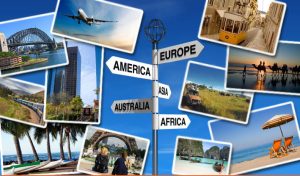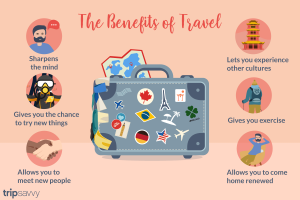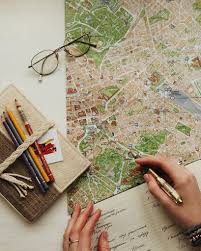
How Travel Helps You Learn New Things

Revealing Personal Growth through Discovery

The Cognitive Advantages of Travel: Widening Your Mind
Exposure to New Cultures and Views Through Travel
Traveling places you in the midst of customs, food, and unfamiliar lifestyles. For example , consuming street food in Thailand or browsing bazaars in Morocco can challenge your notion of what constitutes the norm. Consequently , this exposure changes how you think about the world. Furthermore , you realize there are numerous ways of existing, thinking, and working. As a result , this experience enhances critical thinking by encouraging you to view things from fresh perspectives.
Language Acquisition and Communication Skills
Moreover, traveling is an excellent way to learn a new language. Specifically , even small attempts—like using local expressions—can improve your proficiency. Spoken communication with locals teaches pronunciation, slang, and cultural customs. To support this , carry phrasebooks, listen to local broadcasts, or converse with native speakers. In addition , these efforts enrich your trip and strengthen communication skills across contexts.
Memory and Cognitive Flexibility
Research shows, getting lost in unfamiliar streets, calculating routes, or handling last‑minute issues sharpens your mind and memory. For instance, driving without GPS and asking for directions forces rapid cognitive adaptation. Thus, these mental exercises effectively tone your thinking “muscles.
Building New Skills and Abilities

Navigating New Environments and Problem-Solving
Every trip has its setbacks, from missing transport to linguistic barriers. Handling these challenges teaches you to be flexible. You learn to stay calm, think outside the box to solve the problem, and communicate yourself clearly. When your train is cancelled in a foreign city, figuring out new routes or public transport is a quick lesson in problem-solving. These are the things that boost your confidence in solving day-to-day life challenges.
Culinary Arts and Cultural Traditions
Visiting local culinary classes or handicraft workshops offers practical training. Preparing traditional cuisine or making handmade crafts introduces you to cultural arts and patience. For example learning to make pasta in Italy or bead jewellery in Africa introduces you to diverse work ethics. Acquiring these skills also teaches you patience, perseverance, and adaptability which can be applied to anything in life.
Technological Competence and Autonomy
Traveling usually involves the utilization of apps, maps, and the internet. Learning to use Google Maps to navigate, communicate with language apps, or book last-minute accommodation develops your autonomy. Autonomy that is developed from these skills removes reliance on others for assistance. The more you do for yourself, the more you learn to make spontaneous decisions.
Travel For Personal Development and Emotional Intelligence Developing Resilience and Adaptability
Travel is seldom easy. Flights are delayed, the weather is poor, or there is a language issue. Bouncing through such challenges develops resilience. Missing a bus or spilling your bag in a busy marketplace, for instance, challenges your patience and adaptability. Bouncing through such challenges toughens you up and makes you more resilient.
Fostering Empathy and Cross-Cultural Understanding
Conversation with natives and breaking bread or swapping tales broadens your own knowledge of external cultures. It also increases your emotional intelligence by having you empathize with the perspective of others. Travel professionals concur that this kind of interaction makes you empathetic — the capacity to perceive the world from another’s perspective.
Constructing Independence and Self-Confidence
There’s no feeling quite like acclimating to a new place on your own. Setting little travel challenges, like getting directions or trying a new food, pushes you out of your comfort zone. Each victory sends a confidence surge. Over time, traveling is a way of proving to yourself that you’re capable and independent.
Travel For Educational Opportunities and Formal Learning
 Travel for Study Abroad Programs and Cultural Exchanges
Travel for Study Abroad Programs and Cultural Exchanges
The majority of students and adults find that foreign study opens up their perspectives to new academic and career skills. Living abroad compels you to become familiar with new concepts and adapt to differing classroom culture. Most programs also increase language skills and global knowledge, making them some of the best personal growth experiences.
Volunteer Tourism and Service Projects
Assisting others when abroad provides you with hands-on skills such as project management, teamwork, and communication. Volunteering among communities at home has the potential to transform you. For instance, constructing or working with children provides you with a sense of direction and responsibility, and new skills, which are a form of personal development.
Workshops, Seminars, and Guided Tours
Learning travel or guided tours provides concentrated learning. It may be photography workshops in Paris or walking tours of ancient cities, but these are a combination of learning and enjoyment. It’s a great way to learn more about a topic of interest and explore new places.
The Social Aspects of Learning

Travel Builds New Relationships and Networks
Travel is a natural means of encountering others from across the globe. Exchanging adventures creates an opportunity for friendships and connections that remain long after the journey is over. As a result, these connections may evolve into future partnerships; alternatively, they can broaden your worldview.”
Conclusion
Group activities such as hiking, cooking classes, or cultural festivals promote teamwork and cultural understanding. Most tourists appreciate the friendships or memories sustained through the experience. They promote teamwork, tolerance, and understanding in foreign cultures. Conclusion Traveling is not merely a case of looking at new sights — it is a matter of learning in the real sense. Travel induces you to think, behave, and develop. Each trip provides opportunities to learn new things, understand other cultures better, and gain self-confidence. The more you travel, the more you learn about life and yourself. So grab your bags, venture out of your comfort zone, and start your lifetime of learning. The world awaits to teach you something new.


